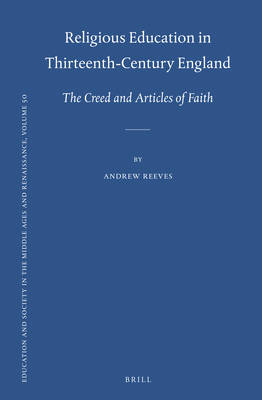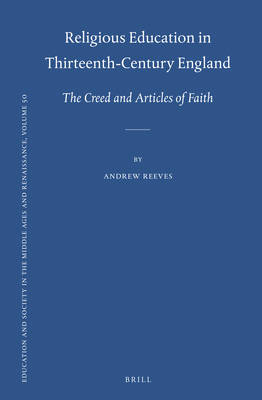
- Afhalen na 1 uur in een winkel met voorraad
- Gratis thuislevering in België vanaf € 30
- Ruim aanbod met 7 miljoen producten
- Afhalen na 1 uur in een winkel met voorraad
- Gratis thuislevering in België vanaf € 30
- Ruim aanbod met 7 miljoen producten
Zoeken
€ 221,45
+ 442 punten
Omschrijving
In Religious Education in Thirteenth-Century England, Andrew Reeves examines how laypeople in a largely illiterate and oral culture learned the basic doctrines of the Christian religion. Although lay religious life is often assumed to have been a tissue of ignorance and superstition, this study shows basic religious training to have been broadly available to laity and clergy alike.
Reeves examines the nature, availability and circulation of sermon manuscripts as well as guidebooks to Christian teachings written for both clergy and literate laypeople. He shows that under the direction of a vigorous and reforming episcopate and aided by the preaching of the friars, clergy had a readily available toolkit to instruct their lay flocks.
Reeves examines the nature, availability and circulation of sermon manuscripts as well as guidebooks to Christian teachings written for both clergy and literate laypeople. He shows that under the direction of a vigorous and reforming episcopate and aided by the preaching of the friars, clergy had a readily available toolkit to instruct their lay flocks.
Specificaties
Betrokkenen
- Auteur(s):
- Uitgeverij:
Inhoud
- Aantal bladzijden:
- 232
- Taal:
- Engels
- Reeks:
- Reeksnummer:
- nr. 50
Eigenschappen
- Productcode (EAN):
- 9789004294431
- Verschijningsdatum:
- 27/05/2015
- Uitvoering:
- Hardcover
- Formaat:
- Genaaid
- Afmetingen:
- 155 mm x 235 mm
- Gewicht:
- 489 g

Alleen bij Standaard Boekhandel
+ 442 punten op je klantenkaart van Standaard Boekhandel
Beoordelingen
We publiceren alleen reviews die voldoen aan de voorwaarden voor reviews. Bekijk onze voorwaarden voor reviews.








